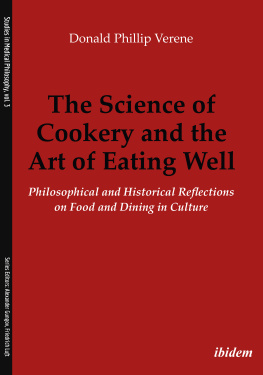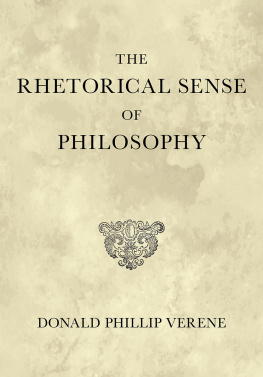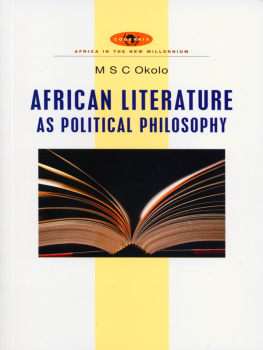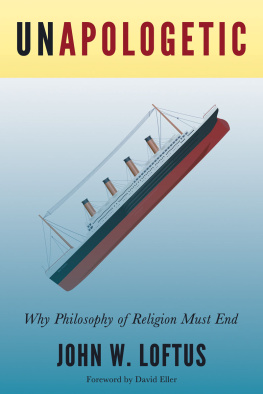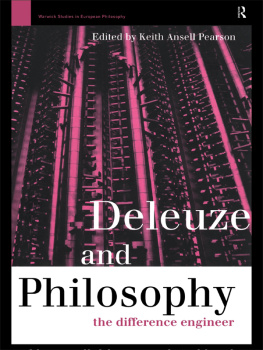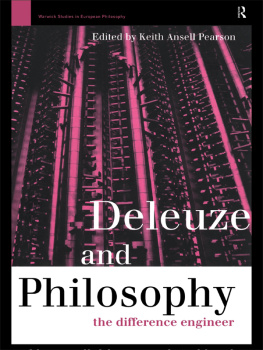Verene - The philosophy of literature: four studies
Here you can read online Verene - The philosophy of literature: four studies full text of the book (entire story) in english for free. Download pdf and epub, get meaning, cover and reviews about this ebook. year: 2018, publisher: Wipf and Stock Publishers, genre: Religion. Description of the work, (preface) as well as reviews are available. Best literature library LitArk.com created for fans of good reading and offers a wide selection of genres:
Romance novel
Science fiction
Adventure
Detective
Science
History
Home and family
Prose
Art
Politics
Computer
Non-fiction
Religion
Business
Children
Humor
Choose a favorite category and find really read worthwhile books. Enjoy immersion in the world of imagination, feel the emotions of the characters or learn something new for yourself, make an fascinating discovery.

- Book:The philosophy of literature: four studies
- Author:
- Publisher:Wipf and Stock Publishers
- Genre:
- Year:2018
- Rating:3 / 5
- Favourites:Add to favourites
- Your mark:
- 60
- 1
- 2
- 3
- 4
- 5
The philosophy of literature: four studies: summary, description and annotation
We offer to read an annotation, description, summary or preface (depends on what the author of the book "The philosophy of literature: four studies" wrote himself). If you haven't found the necessary information about the book — write in the comments, we will try to find it.
Verene: author's other books
Who wrote The philosophy of literature: four studies? Find out the surname, the name of the author of the book and a list of all author's works by series.
The philosophy of literature: four studies — read online for free the complete book (whole text) full work
Below is the text of the book, divided by pages. System saving the place of the last page read, allows you to conveniently read the book "The philosophy of literature: four studies" online for free, without having to search again every time where you left off. Put a bookmark, and you can go to the page where you finished reading at any time.
Font size:
Interval:
Bookmark:
Four Studies
Donald Phillip Verene

The Philosophy of Literature
Four Studies
Copyright 2018 Donald Phillip Verene. All rights reserved. Except for brief quotations in critical publications or reviews, no part of this book may be reproduced in any manner without prior written permission from the publisher. Write: Permissions, Wipf and Stock Publishers, W. th Ave., Suite , Eugene, OR 97401 .
Cascade Books
An Imprint of Wipf and Stock Publishers
W. th Ave., Suite
Eugene, OR 97401
www.wipfandstock.com
paperback isbn: 978-1-5326-4173-2
hardcover isbn: 978-1-5326-4174-9
ebook isbn: 978-1-5326-4175-6
Cataloguing-in-Publication data:
Names: Verene, Donald Phillip, 1937 , author.
Title: The philosophy of literature : four studies / Donald Phillip Verene.
Description: Eugene, OR : Cascade Books, 2018 | Includes bibliographical references and index.
Identifiers: isbn 978-1-5326-4173-2 ( paperback ) | isbn 978-1-5326-4174-9 ( hardcover ) | isbn 978-1-5326-4175-6 ( ebook )
Subjects: LCSH: LiteraturePhilosophy.
Classification: PN49 .V49 2018 ( paperback ) | PN49 .V49 ( ebook )
Manufactured in the U.S.A. 09/17/15
In memory of
Samuel Moon
1922 2011
Poet and teacher of literature
at Knox College
Above all, literature keeps language alive as our collective heritage.
Umberto Eco, On Literature
The sole advantage in possessing great works of literature lies in what they can help us to become.
George Santayana, Three Philosophical Poets
W ords are the natural bodies of thought. The languages and literatures in which the words live are the tongue and heart of the humanities. Since the eighteenth century, philosophy has progressively attached itself to various fields of human knowledge and forms of culture. This conception of philosophy has resulted in a series of philosophies of. Modern philosophy contains formulations such as the philosophy of science, philosophy of history, and philosophy of religion, and broader designations, such as philosophy of nature, philosophy of human nature, and philosophy of culture. These philosophies of assume a transcendental standpoint, as found in the Kantian conception of critique; their aim is to make explicit the presuppositions, principles, and methods that account for the possibility of their subject matters.
Thought of as one of these fields of philosophies of, the philosophy of literature considers the question of what literature is and the place it occupies in the imagination. In addition to this transcendental inquiry into literature as a subject matter, philosophy realizes that it itself is a kind of literature. Philosophy exists only in and through its use of words. Philosophy is a linguistic art. Through its words, philosophy attempts to take thought to what is ultimateto the really real, to ontos on , and to the greatest good, summum bonum . This linguistic journey is the center of speculative philosophy, as distinct from critical philosophy. The self-satisfaction of critical philosophy is disturbed by the speculative use of the minds eye to apprehend the divine, the transcendent realm of ideas. The Socratic question, unlike the transcendental method, seeks the unseen in the seen.
The speculative imagination and the poetic imagination have a common origin in the mythic imagination, in the narratives from which all human culture arises. From the archetypal images in the primal myths come the words, customs, deeds, and laws of all the nations at war and in peace. The images are the original orientations from which the divine, civil, and natural orders emerge. Without a comprehension of the myth, humanity has no basis from which to apprehend its own autobiography.
Put in James Joyces terms, from litter comes letter comes literature. From literature comes philosophy, when the idea is extracted from the image. When putting ideas into words, philosophy pursues a speech of pure thought. The speech of pure thought remains an ideal. Philosophical speech still requires the image as a means to access the idea. In philosophical literature we find an abiding dialectic between image as the medium of the imagination and idea as the medium of reason. When the philosophers reason forms itself in words, it finds itself among the etymologies and images that words bring with them. In using language the philosopher goes to school with the poet. Even when philosophical language is employed for the pure expression of arguments and conceptual analysis, metaphors and the images that accompany them are required to make the points asserted comprehensible. The reader may pass over the presence of the metaphors, but they are there, embedded in the text.
How are we to understand the relation of philosophy to literature? There are, I think, four ways in which we may answer this question. I intend these to be not a rigid classification but a general scheme. Philosophy may be brought into connection with literature in more than one of these ways at once. In the four chapters that follow, I wish primarily to align a single work of literature with each of these ways, without fully excluding the others.
First, we may think of a work of literature as a kind of philosophy. In such a work, philosophical thought is merged fully into its forms of literary expression such that the reader thinks both philosophically and poetically at the same time. In such a work the author has deliberately put the literary imagination in the service of philosophical thought. We find this union in many of Jorge Luis Borgess Ficciones . It is especially evident in El inmortal ( The Immortal ), which is the subject of chapter of the present work.
Second, we may connect philosophy to literature in the specific sense of philosophy of literature. In such a connection, philosophy maintains its separate stance from the work of literature and becomes the means for comprehending it. Philosophy in this way brings its own interests to the literary work being interpreted, and in so doing we see the literary work in philosophical terms. Chapter takes this approach to interpreting the intricate text of James Joyces Finnegans Wake .
Third, we may connect philosophy to a work of literature by searching out philosophical ideas that happen to reside in it. The purpose in this connection of philosophy to literature is neither to approach a work of literature as a type of philosophizing nor to develop a comprehensive interpretation of it in philosophical terms. A work of literature is regarded as a source of ideas of philosophical interest: the divine, the self, and the world. The work is regarded not as particularly philosophical in form but as a repository of philosophical insights. Carl Sandburgs epic poem, The People, Yes is discussed from this perspective in chapter .
Fourth, we may place a work of philosophy in a dialectical relation to a work of literature such that we may speak of philosophy and literature. This approach places two particular works side by side, one philosophical and one literary. Each may illuminate the other. They are both concerned with the same theme but each takes it up differently. The reader is not on one side more than another, and can consider the theme from each direction. The two works form a pair, one enriching the other. Chapter takes this approach by joining G. W. F. Hegels Phenomenology of Spirit ( Phnomenologie des Geistes ) with Sebastian Brants Ship of Fools ( Das Narrenschiff ). Such a pairing suggests a way of doing philosophy in which philosophy and literature function as companions in the larger project of humanistic thought.
Font size:
Interval:
Bookmark:
Similar books «The philosophy of literature: four studies»
Look at similar books to The philosophy of literature: four studies. We have selected literature similar in name and meaning in the hope of providing readers with more options to find new, interesting, not yet read works.
Discussion, reviews of the book The philosophy of literature: four studies and just readers' own opinions. Leave your comments, write what you think about the work, its meaning or the main characters. Specify what exactly you liked and what you didn't like, and why you think so.

